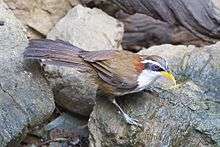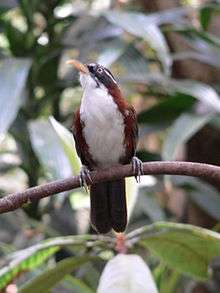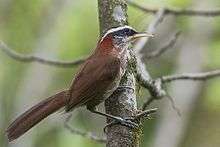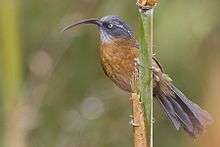Pomatorhinus
Pomatorhinus is a genus of scimitar babblers, jungle birds with long downcurved bills. These are birds of tropical Asia, with the greatest number of species occurring in hills of the Himalayas.
| Pomatorhinus | |
|---|---|
.jpg) | |
| Taiwan scimitar babbler (Pomatorhinus musicus) | |
| Scientific classification | |
| Kingdom: | Animalia |
| Phylum: | Chordata |
| Class: | Aves |
| Order: | Passeriformes |
| Family: | Timaliidae |
| Genus: | Pomatorhinus Horsfield, 1821 |
| Species | |
|
See text | |
These are medium-sized, floppy-tailed landbirds with soft plumage. They are typically long-tailed, dark brown above, and white or orange-brown below. Many have striking head patterns, with a broad black band through the eye, bordered with white above and below.
They have strong legs and are quite terrestrial. Like other babblers, these are noisy birds, and the characteristic bubbling calls are often the best indication that these birds are present. As with other babbler species, they frequently occur in groups of up to a dozen, and the rainforest species like Indian scimitar babbler often occur in the mixed feeding flocks typical of tropical Asian jungle.
Species
The species are:[1]
| Image | Common Name | Scientific name | Distribution |
|---|---|---|---|
| Indian scimitar babbler | Pomatorhinus horsfieldii | Rajasthan and Orissa, India | |
.jpg) | Sri Lanka scimitar babbler | Pomatorhinus melanurus | Sri Lanka |
 | White-browed scimitar babbler | Pomatorhinus schisticeps | Bangladesh, Bhutan, Cambodia, India, Laos, Myanmar, Nepal, Thailand, and Vietnam. |
 | Chestnut-backed scimitar babbler | Pomatorhinus montanus | Brunei, Indonesia, Malaysia, and Thailand. |
 | Streak-breasted scimitar babbler | Pomatorhinus ruficollis | Bangladesh, Bhutan, China, India, Laos, Myanmar, Nepal, and Vietnam. |
.jpg) | Taiwan scimitar babbler | Pomatorhinus musicus | Taiwan |
| Red-billed scimitar babbler | Pomatorhinus ochraceiceps | Northeast India, Southeast Asia and adjacent parts of southern China. | |
.jpg) | Coral-billed scimitar babbler | Pomatorhinus ferruginosus | Bhutan, India, Nepal, China, Thailand. |
 | Slender-billed scimitar babbler | Pomatorhinus superciliaris | the Himalayas to north-western Vietnam. |
References
- Gill, Frank; Donsker, David, eds. (2016). "Babblers & fulvettas". World Bird List Version 6.4. International Ornithologists' Union. Retrieved 15 December 2016.
- Collar, N. J. & Robson, C. 2007. Family Timaliidae (Babblers) pp. 70 – 291 in; del Hoyo, J., Elliott, A. & Christie, D.A. eds. Handbook of the Birds of the World, Vol. 12. Picathartes to Tits and Chickadees. Lynx Edicions, Barcelona.
External links

